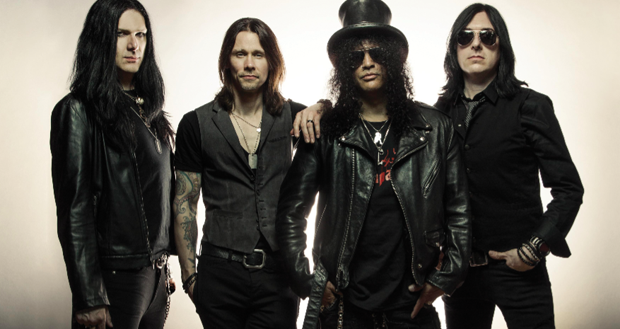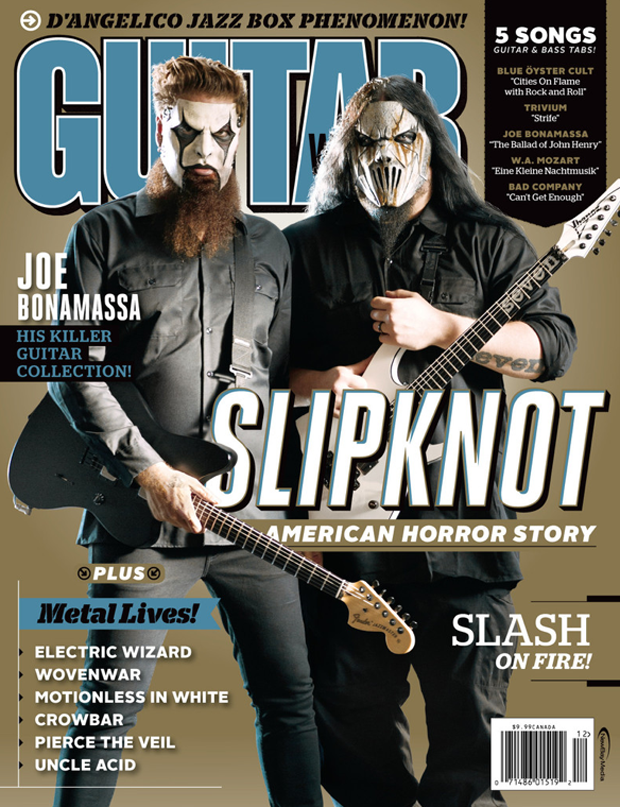Slash Discusses His New Album with Myles Kennedy and the Conspirators, 'World on Fire'

This is an excerpt from the December 2014 issue of Guitar World. For the rest of this Slash story, plus features on Slipknot, Joe Bonamassa, Lenny Kravitz, Paul Gilbert, Motionless In White, Electric Wizard and more, including lessons, tabs and reviews of new gear from D'Angelico, Washburn, Boss, Morley, Lace Music and Carr Amps, check out the December 2014 issue at the Guitar World Online Store.
Slash and Burn: Everyone’s favorite hard-rocking riffmaster returns with World on Fire, his new searing-hot album with Myles Kennedy and the Conspirators.
When
Guitar World
catches up with Slash, it’s still weeks before the release of
World on Fire
, his new and second album with his band, Myles Kennedy and the Conspirators. And yet, he, Kennedy, bassist Todd Kerns and drummer Brent Fitz have already been out on the road supporting the album for more than a month, opening up a string of arena shows for Slash’s old friends in Aerosmith.
“We hadn’t planned on being out this summer,” he admits. “But it sounded like such a great rock and roll package, and there’s so much camaraderie between the bands. So it was something we decided to tack on in front of the album release and tour.”
For Slash, the extra gigs seem to be par for the course. Despite now being more than a quarter century into his recording career, the 49-year-old musician and established guitar legend is working and playing as hard as ever. In the past few years alone, he’s recorded and released a star-studded solo album [2010’s
Slash
], an effort with Kennedy and the Conspirators [2012’s
Apocalyptic Love
] and a full soundtrack album to a movie on which he served as producer [2013’s
Nothing Left to Fear
].
And then there’s the new
World on Fire
. Slash began working on the album almost immediately after coming off the tour for
Apocalyptic Love
, and the result is another bold and unapologetically riffy statement, exemplified in high-octane barnburners like the title track, “30 Years to Life” and “Avalon.” But there’s also plenty of diversity in the album’s 17—yes, 17—tracks, from the epic “Iris of the Storm” and the cinematic, dark-hued “The Unholy,” to the soaring pop-rock workout “The Dissident” and the instrumental guitar showcase “Safari Inn.”
It’s a varied, immersive and incredibly hard-rocking effort, and one that, Slash says, is a product of the exceptional musical relationship he enjoys with his current band. Working with Kennedy and the Conspirators, he says, “feels as solid, if not more so, than anything I’ve done in a really long time.” And so, while the outfit gears up for another worldwide jaunt in support of World on Fire, Slash is already looking toward the future. “I was backstage before our show at the Forum [in Inglewood, California] the other day, and I actually recorded the first new idea toward the next record,” he says. “So I’m excited to jam it at soundcheck with the guys.” He laughs. “Not that I’m thinking that far ahead.”
EXCERPT: You stayed out on the road for a year and a half in support of Apocalyptic Love, and it seems as if right after that tour ended you started work on World on Fire.
It did happen pretty fast. The tour finished up in July [2013] and I took some time to hang out at home. Because every time I go out on the road, I’m more or less gone for a year. So you come home and you chill out for a minute and decompress. But by September, I was getting anxious. I started picking through the ideas I had recorded into my phone on the road and seeing which ones I wanted to pursue. Then I think it was in October that I started going into the studio a couple days a week to jam with Brent and Todd. I didn’t have a deadline or anything like that, but we started jamming and it started moving. We had a lot of material pretty quickly. Then Myles came in and we started hashing out the arrangements. And the next thing you know, Mike [producer Michael “Elvis” Baskette] was over and we were knee deep in pre-production.
Did you say that when you’re on the road you record song ideas into your phone?
I do. [laughs] On an acoustic-electric. I have all the tools to record proper demos; I have Pro Tools on my laptop. But, you know, anything that takes more than two seconds to set up, I just hate doing it. If I have to pull out some guitar cords and hook the thing up, put some headphones on, do all that shit, by the time I’m ready to go I don’t even feel like it anymore. I have to strike the second the inspiration happens. And the phone is the fastest fucking way to just put down an idea.
Can you point to any material on the new album that came from a phone riff?
Every song. [laughs] Actually, there are two that have older origins. One is “Dirty Girl,” which came from demos I made back when I was doing the first solo record. The other is “Shadow Life.” The main riff in that song was actually a part of “You’re a Lie” [from
Apocalyptic Love
]. We were just about to record “You’re a Lie” and I started realizing the chorus wasn’t working. As much as I hated to do it, I pulled out the coolest riff in the song and came up with another idea for the chorus. But I’ve always loved the riff I pulled out and I didn’t want to lose it. And the thing is, I have a really hard time going back and revisiting old stuff. I hate doing it and I won’t do it. It’s like pulling teeth to me.
But this one riff—when we started on this record everybody wanted to see where we were gonna go with it. And that riff became “Shadow Life.” That was actually the one song on the record that Todd had some input on as well. He wrote the verse, and that really sort of helped steer the direction of the song away from sounding like “You’re a Lie.”
This record has a lot of music on it, and also a lot of diversity.
It’s just what was coming out. I sit around in dressing rooms and hotel rooms—probably all the time I used to spend out at the bar—and I just write. And I write a lot of different types of stuff. I think that’s one of the reasons I jam with a lot of different sorts of people, just to not be pigeonholed into one style. It’s not a conscious thing, but I like different types of things and I like to play them.
And with Myles, I’ve found that anything I come up with, if I think it’s good, I can present it to him and nine times out of 10 he’ll come up with a melody for it. And that really broadens the scope so that I can actually do a lot of stuff that I maybe wouldn’t be able to do with the likes of, say, Velvet Revolver. Even with GN’R, back in the day, there were certain songs I ended up doing with other people because they didn’t work with Guns.
Like what?
A good example is “Always on the Run” [which appeared on Lenny Kravitz’s 1991 album,
Mama Said
]. I wrote it during Guns, but I don’t remember there ever being any interest in it from the guys. So it was just a riff I had that Lenny happened to hear me playing. It wasn’t something I presented to him. He heard me playing it in the recording studio when I was doing “Fields of Joy” [Slash contributes guitar to this track, also from Mama Said]. I guess in between takes or something I was fucking with that riff, and Lenny was like, “Oh, what’s that?” And that’s how that happened.
Photo: Travis Shinn
This is an excerpt from the December 2014 issue of Guitar World. For the rest of this Slash story, plus features on Slipknot, Joe Bonamassa, Lenny Kravitz, Paul Gilbert, Motionless In White, Electric Wizard and more, including lessons, tabs and reviews of new gear from D'Angelico, Washburn, Boss, Morley, Lace Music and Carr Amps, check out the December 2014 issue at the Guitar World Online Store.

Get The Pick Newsletter
All the latest guitar news, interviews, lessons, reviews, deals and more, direct to your inbox!
Rich is the co-author of the best-selling Nöthin' But a Good Time: The Uncensored History of the '80s Hard Rock Explosion. He is also a recording and performing musician, and a former editor of Guitar World magazine and executive editor of Guitar Aficionado magazine. He has authored several additional books, among them Kurt Cobain: Montage of Heck, the companion to the documentary of the same name.

